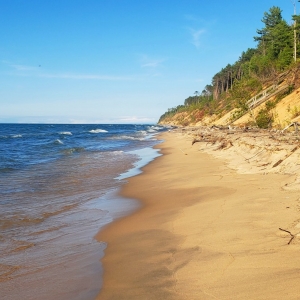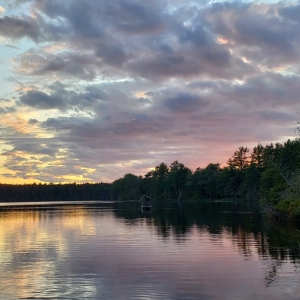The Stream, February 24, 2021: Chicago Backs Deal To Supply Lake Michigan Water To Joliet
YOUR GLOBAL RUNDOWN
- Chicago strikes a century-long deal to supply water to a suburb that was depleting its groundwater.
- A new report finds that nearly a third of global freshwater fish populations are endangered.
- Residents in Alaska are protesting the short public comment period for several water rights permits issued to a proposed open-pit mine.
- The U.S. Supreme Court holds the second hearing for a years-long water dispute between Georgia and Florida.
Thousands in Mississippi and Louisiana are still without water as temperatures melt snow and ice throughout the states.
“Louisiana has been treated very much like a stepchild in this crisis.” – Shreveport Mayor Adrian Perkins. Tens of thousands of people in Mississippi and Louisiana were still without water as of Monday even as rising temperatures melted snow and ice, the Associated Press reports. The Mississippi Emergency Management Agency has so far supplied 131,000 bottles of water statewide and in Louisiana, boil-water advisories were in place for hundreds of thousands of residents.
IN RECENT WATER NEWS
The Future of Lake Superior with Climate Disruption
The Great Lakes are warming. For the coldest and largest of the lakes, Lake Superior, that could mean a lot of changes. Researchers are still sorting out what the future might be, but a lot of it doesn’t look good.
Climate change is affecting Lake Superior in some volatile ways. Its surface temperature has been going up, but in wild fluctuations. The average wind speeds have been increasing five percent each decade since 1980. And Superior has been pounded by three five hundred-year to one thousand-year storm events in the past eight years.
This story was published as part of the Ready or Not project from the Great Lakes News Collaborative.
In Case You Missed It:
Like Developing Nations, Texas Confronts Lingering Water Crisis – More than 1,100 water suppliers affected, nearly half the state’s residents scavenge for clean water.
HotSpots H2O: Minnesota Rolls Out Plan for PFAS Contamination – Minnesota officials announced a multi-step strategy to address PFAS contamination in the environment.
New Report Finds Global Freshwater Fish Populations At Risk For Extinction
A new World Wildlife Fund report found that nearly a third of global freshwater fish populations are endangered. Conditions that have caused the near mass extinction of freshwater fish include damming rivers, draining wetlands, over-extracting water, water pollution, unsustainable fishing practices, and climate change. The report calls on world leaders to implement policies and practices to improve rivers, lakes, and wetlands and “reverse decades of decline in freshwater fish populations.”
TODAY’S TOP WATER STORIES, TOLD IN NUMBERS
12 WATER RIGHTS PERMITS
Residents in Alaska’s Yukon-Kuskokwim Delta say that 15 days is not enough time to submit public comment on 12 water rights permits granted to an open-pit mine, the Associated Press reports. Local residents and representatives are concerned that pandemic lockdowns and limited internet access prevent them from providing meaningful feedback on the permits in that amount of time. If completed, the mine would be one of the largest open-pit mines in the world. The water right permits give the Donlin gold mine permission to take water from 12 streams that could disrupt food security in the region, according to Orutsararmuit Native Council member Bev Hoffman.
100-YEAR DEAL
The Chicago City Council Finance Committee backed a 100-year deal to supply Lake Michigan drinking water to its southwest suburb Joliet, which is also the state’s fourth-largest city. CBS Chicago reports that the deal will bring between $24 million and $37 million a year in revenue to Chicago. Under the agreement approved in January, Joliet is expected to pay for the pipeline and other infrastructure improvements to connect with Chicago. Those projects are estimated to cost between $600 million and $800 million. The pipeline is expected to be completed by 2030. Joliet needs an alternate water source because its groundwater is being depleted.
ON THE RADAR
Georgia and Florida made their cases for the second time in front of the U.S. Supreme Court in a long-running dispute over water that flows from northern Georgia to the Gulf of Mexico. The Associated Press reports that Florida claims that the decimation of its oyster industry is due to overuse of water by farmers in the Flint River basin. Georgia, however, faults the overharvesting of oysters and historic droughts and mismanagement. A decision on the case is expected by late June.
In context: In Supreme Court, Florida and Georgia Argue Over Water Use
Jane is a Communications Associate for Circle of Blue. She writes The Stream and has covered domestic and international water issues for Circle of Blue. She is a recent graduate of Grand Valley State University, where she studied Multimedia Journalism and Women, Gender and Sexuality Studies. During her time at Grand Valley, she was the host of the Community Service Learning Center podcast Be the Change. Currently based in Grand Rapids, Michigan, Jane enjoys listening to music, reading and spending time outdoors.







Leave a Reply
Want to join the discussion?Feel free to contribute!